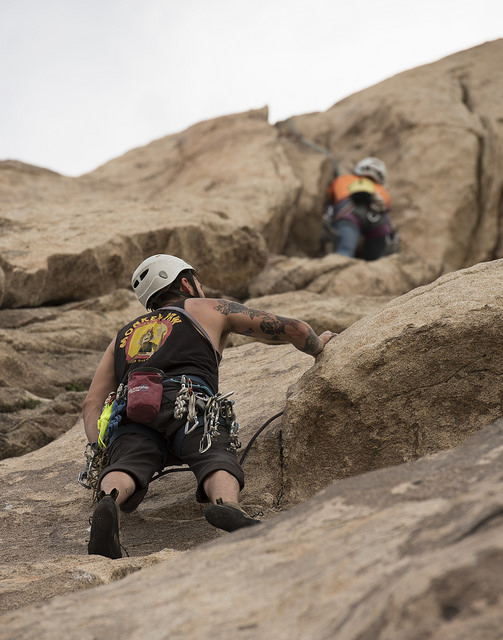What Can Leaders Learn from Rock Climbing?
 [We’re pleased to welcome Diane Bischak and Jaana Woiceshyn. Diane and Jaana recently published an article entitled “Leadership Virtues Exposed: Ethical Leadership Lessons from Leading in Rock Climbing” in Journal of Leadership & Organizational Studies.]
[We’re pleased to welcome Diane Bischak and Jaana Woiceshyn. Diane and Jaana recently published an article entitled “Leadership Virtues Exposed: Ethical Leadership Lessons from Leading in Rock Climbing” in Journal of Leadership & Organizational Studies.]
Diane has been an avid participant in rock climbing for many years, a sport which has a very tangible leadership element. She was wondering if the lessons she had learned about leading in rock climbing could be applied to business, which (operations management in particular) she teaches. She asked me, a strategy and business ethics professor, to explore that with her. Having tried rock climbing and also participated in wilderness expeditions both as a leader and a team member, I was immediately interested—because leadership clearly matters, in business and beyond.
The exposed nature of leadership practices in rock climbing makes them highly observable, unlike leadership in business and many other contexts where such practices are mostly opaque to researchers who typically are outsiders to organizations they study. So we pursued our analysis to see what we would find, with a focus on positive practices guided by leadership virtues.
Three findings were particularly surprising. First, the parallels between rock climbing leadership and business leadership are closer than one would think at the first glance, given the strong cognitive component and long-term orientation of rock climbing leadership. Second, rationality, which is often not recognized as a leadership virtue at all, appears to be fundamental to virtuous leadership in rock climbing, and also in business. Third, we did not detect confirmation for the notion of leaders as servants in the rock climbing world. Rather, leaders and
followers achieve best outcomes (successful climbs over the long term) by trading value for value, instead of leaders merely serving the needs of their followers.
We think our findings suggest practical implications for leaders in business and other realms by emphasizing the trader relationship of leaders and followers, and rationality—adherence to facts by the means of observation and logic—as the fundamental virtue guiding sound leadership practices. Rest of the virtues, such as honesty and justice, are derived from rationality.
As for research, we hope to see further qualitative and quantitative studies of the leadership virtues we identified in the context of rock climbing, including textual analysis and surveys.
The abstract for the paper:
Leadership clearly has an impact on organizational outcomes, and previous research has revealed the antecedents and consequences of leadership styles and the effects of leaders’ personality traits. We focus on an area that has received much less attention: ethical leadership practice and the virtues that guide it. Following the positive turn in leadership research, we examine what constitutes virtuous action of leaders. We draw on observations made in a novel realm, rock climbing, and integrate them with the literature on leadership virtues while drawing parallels to business. We identify six essential virtues at the core of the ethical leadership model we propose: rationality, honesty, independence, integrity, justice, and pride. Three of these—rationality, independence, and pride—are not conventional virtues, but we suggest that they are critical for ethical leadership, as is the standard of human flourishing and the leader’s relationship with followers as a trader of values. Our analysis is summarized in testable propositions.
You can read “Leadership Virtues Exposed: Ethical Leadership Lessons from Leading in Rock Climbing” from Journal of Leadership & Organizational Studies free for the next two weeks by clicking here. Want to know all about the latest research from Journal of Leadership & Organizational Studies? Click here to sign up for e-alerts!
During the month of April, you can access 1.5 million article across SAGE Publishing’s 940+ journals for free–how? Sign up here for free trial access!































































































